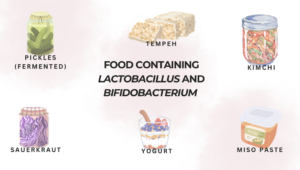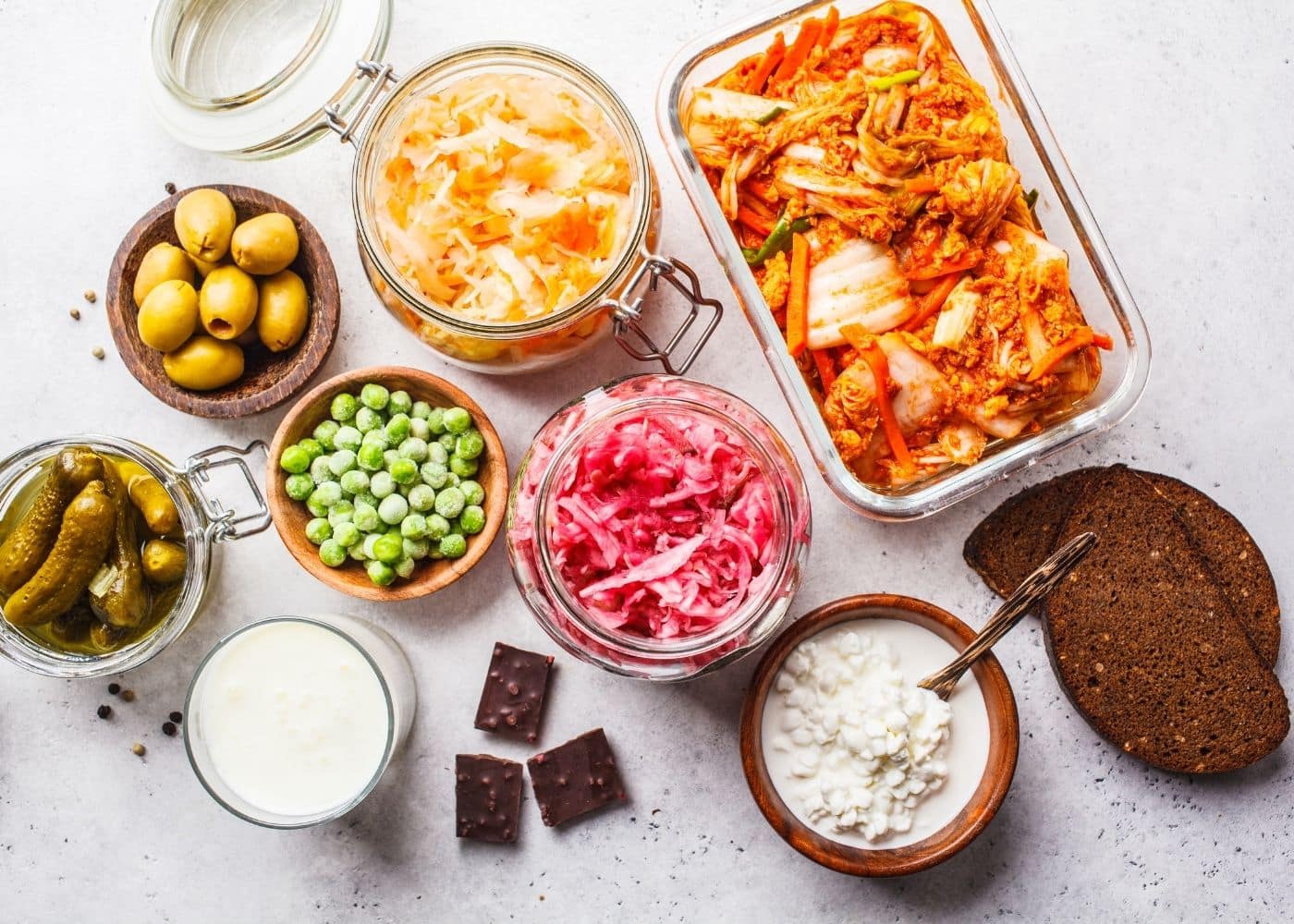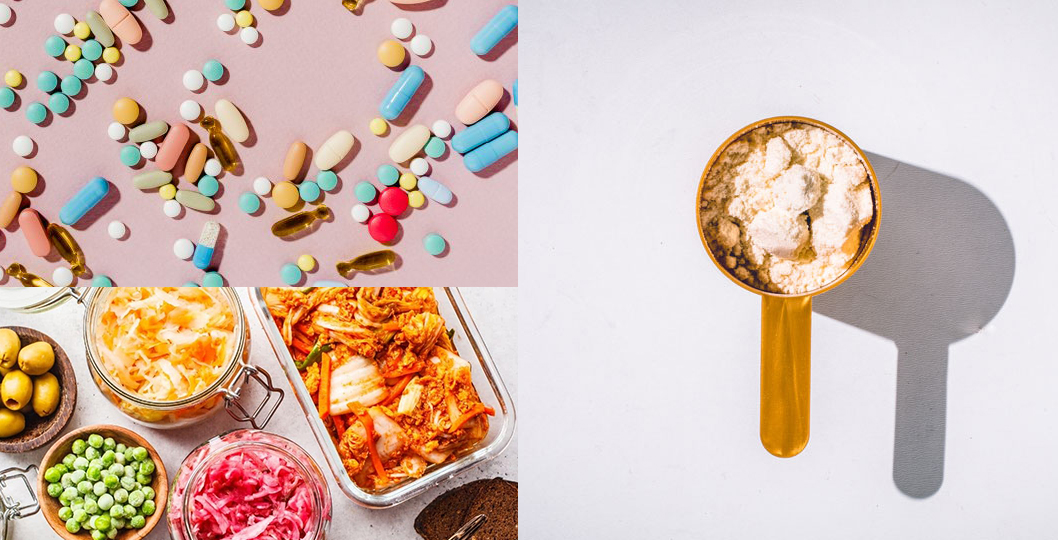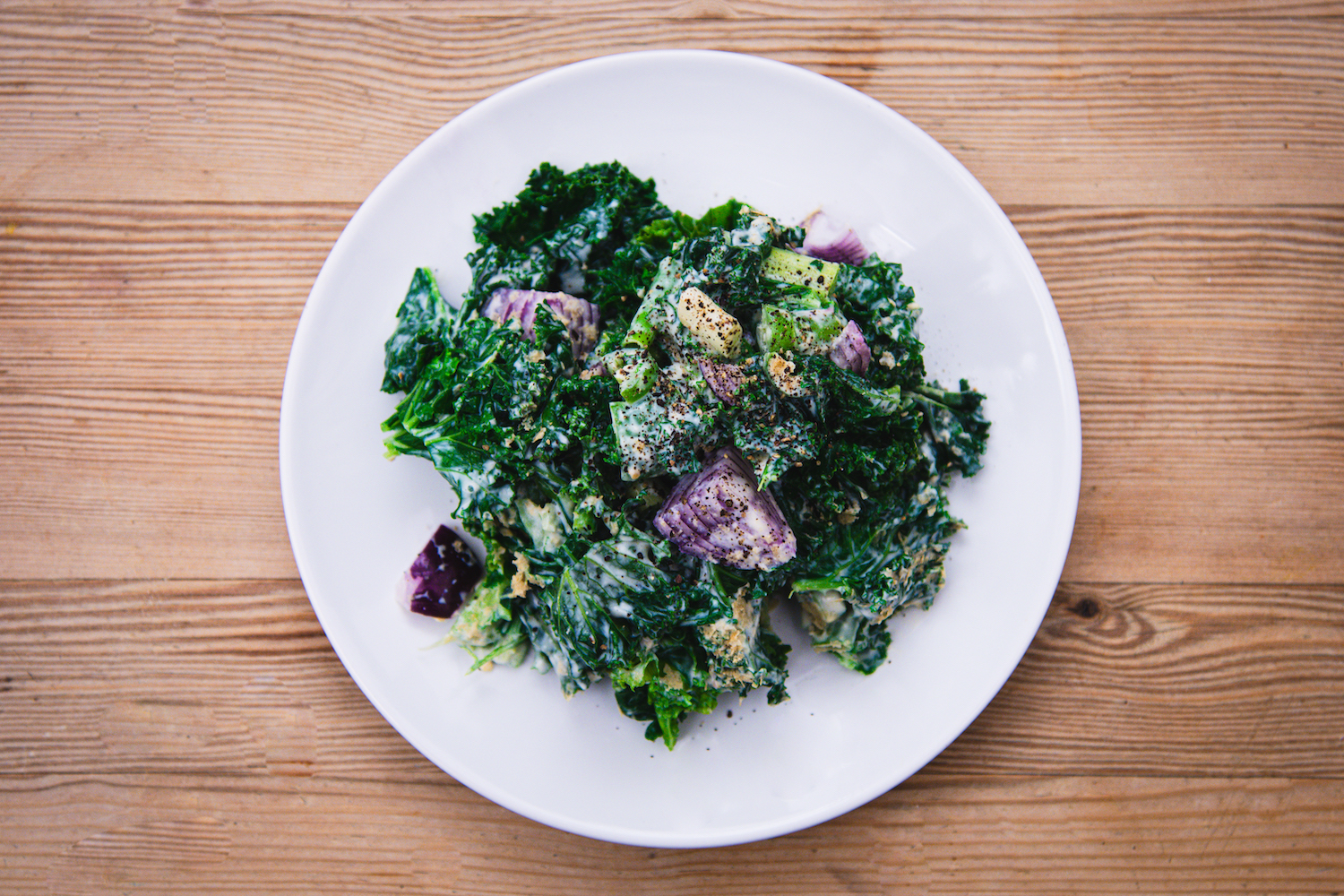There’s a big difference between prebiotics vs probiotics. In fact, a healthy gut microbiome should have BOTH. Here’s why.
Prebiotics and probiotics have become buzzwords in nutrition these days. Still, despite sounding similar, they actually play different roles in your health.
Probiotics are live, “friendly” bacteria. Prebiotics are food for them. In this article, we’ll explore what you need to know about the differences between probiotics vs prebiotics.
What Are Probiotics?
The definition of probiotics is “live microorganisms that, when administered in adequate amounts, confer a health benefit on the host.”
Yet, what exactly does that mean?
When we say “biotic” we’re referring to something that is “relating to or resulting from living organisms.”
Add “pro,” and we’re talking about something that has a positive, or favourable, effect.
In essence, probiotics are live microbes that can have direct health benefits.
What Are Prebiotics?
The definition of prebiotics is “a non-digestible food ingredient that promotes the growth of beneficial microorganisms in the intestines.”
“Pre” tells us it’s something that happens before.
In this way, prebiotics are a prerequisite to probiotics.
What’s the Difference Between Prebiotics vs. Probiotics
- Probiotics. Live bacteria found in certain foods or supplements that provide health benefits.
- Prebiotics. Food components that come from types of carbohydrates (mostly fiber) we can’t digest. Probiotics feed on these to grow and survive.
Your friendly bacteria (probiotics) need prebiotics to survive. Different prebiotics stimulates the growth of different gut bacteria.
Different prebiotics stimulate growth of different gut bacteria.
Still, the power of prebiotics to modify gut microbial communities depends on the specific strains and species, as well as pH and other factors of the gut environment.
Probiotics Benefits
Probiotics are alive. They balance your gut flora and help make you less prone to certain diseases like gastroenteritis, or can be used to restore your gut ecosystem of the gut after a dose of antibiotics.
Probiotics can be used to restore your gut ecosystem of the gut after a dose of antibiotics.
Fermentation feeds the beneficial bacteria colonies (including probiotic bacteria) and helps to increase the number of desirable bacteria in our gut that are associated with better health and reduced disease risk.
What is the Best Way to Get Probiotics?
Many companies offer their own probiotic formulations, either as pills or powders. If you’re looking for a probiotic supplement, we recommend you go for probiotics in sachets. Every time you open “stored powder” probiotics, you are releasing some of the living bacteria. So it’s best to buy contained probiotics.
Still, you can also eat your way to more probiotics.
Foods with Probiotics
Probiotics are naturally made during the process of fermentation in foods like sauerkraut, miso, and kimchi. The following foods are abundant in probiotics, and are worth regularly including in your diet.
Sauerkraut
Sauerkraut is fermented cabbage that undergoes lactic acid fermentation by lactic acid bacteria, primarily Lactobacillus species. Research suggests that sauerkraut consumption can positively impact gut microbial populations. The fermentation process of sauerkraut leads to an increase in beneficial gut bacteria, such as Lactobacillus plantarum, while reducing the abundance of potentially harmful bacteria.20
Miso
Miso is a traditional Japanese seasoning made by fermenting soybeans with salt and a fungus called koji. This fungus produces enzymes that break down complex carbohydrates and proteins. During fermentation, probiotic bacteria such as Lactobacillus and Bifidobacterium grow, which can improve gut health. These probiotics help increase the diversity of gut microbes, leading to a healthier gut microbiome. The fermentation process of miso leads to the production of bioactive compounds that have antimicrobial properties, which may help promote a healthy balance of gut bacteria.18 25
Pickles
Pickles are cucumbers that have been fermented in a brine solution containing salt and beneficial bacteria, typically Lactobacillus species. The fermentation process creates an acidic environment that inhibits the growth of harmful bacteria while promoting the growth of beneficial bacteria. This balance may support gut health and may contribute to overall well-being.19
Tempeh
Tempeh is a fermented soybean product originating from Indonesia, produced by fermenting cooked soybeans with the fungus Rhizopus oligosporus. Research suggests that tempeh consumption can positively impact gut microbial populations as tempeh consumption can lead to an increase in beneficial gut bacteria, such as Bifidobacterium and Lactobacillus.22
Sourdough
Sourdough bread is made through fermentation of dough using naturally occurring lactobacilli and yeast. The fermentation process of sourdough promotes the growth of beneficial bacteria and yeast, which may contribute to a healthier gut microbiota. The fermentation also leads to the production of organic acids and other bioactive compounds that have antimicrobial properties.21
Tempeh
Tempeh is a fermented soybean product originating from Indonesia, produced by fermenting cooked soybeans with the fungus Rhizopus oligosporus. Research suggests that tempeh consumption can positively impact gut microbial populations as tempeh consumption can lead to an increase in beneficial gut bacteria, such as Bifidobacterium and Lactobacillus.22
Yogurt
Yogurt is a fermented dairy product made by fermenting milk with specific bacterial cultures, primarily Lactobacillus bulgaricus and Streptococcus thermophilus. Regular consumption of yogurt has been shown to increase beneficial gut bacteria, such as Bifidobacterium and Lactobacillus, which may support digestive health and overall well-being.23
Kefir
Kefir is a fermented product that is often made by inoculating dairy milk with kefir grains. These grains contain a combination of bacteria and yeast that can positively impact microbial populations in the gut. Other kefirs can be made with water or plant-based milks. Kefir consumption increases beneficial gut bacteria, such as Lactobacillus and Bifidobacterium, while reducing the abundance of harmful bacteria.16
Kombucha
Kombucha is a fermented tea beverage made by fermenting sweetened tea with a symbiotic culture of bacteria and yeast. Studies have shown that the fermentation process produces organic acids and antimicrobial compounds that can inhibit the growth of harmful bacteria. These antimicrobial properties may contribute to a healthier microbial balance in the gut. Kombucha is traditionally made by fermenting sweetened tea. The fermentation process requires the presence of a SCOBY (symbiotic culture of bacteria and yeast) which feeds on the nutrients provided by the tea. During fermentation, the sugar in the tea is broken down by the yeast and bacteria, which produces organic acids, carbon dioxide, and trace amounts of alcohol. However, the final product may still contain some residual sugar depending on how long the fermentation process lasts.17 26 It is essential to understand that the amount of sugar in commercial kombucha products may vary, therefore, individuals who track their sugar intake should be cautious about the sugar content in the kombucha they drink and choose options with lower sugar content if required.

What is the Best Way to Get Prebiotics?
A series of plant-based foods contain potential sources of prebiotics. Look to fruit, vegetables, cereals, and other edible plants for your prebiotic boost!
Other artificially produced sources are, among others: lactulose, galactooligosaccharides, and fructooligosaccharides.
Generally, fructans, such as inulin and oligofructose, are considered the most used and effective.
Foods with Prebiotics
- Apples
- Asparagus
- Bananas
- Barley
- Edamame
- Garlic
- Leeds
- Mushrooms
- Oats
- Onions
- Wheat bran
Which is Better: Probiotics or Prebiotics?
Neither is necessarily better. Rather, they both work together to support your microbiome and overall gut health. If you don’t have prebiotics, your probiotic bacteria will perish!
Instead of relying on enriched supplements, we’d recommend you focus on a diet rich in a variety of fruits, vegetables, whole grains, and fermented foods.
For most people that would be sufficient for their prebiotic and probiotic needs.
Can You Take Prebiotics and Probiotics Together
Do you question whether it is safe to combine prebiotics and probiotics to improve your gut health? You don’t have to worry. Combining prebiotics and probiotics together is safe and actually very beneficial.
Prebiotics, like inulin and oligofructose, provide “food” for probiotics, allowing them to grow and work better in the gut.¹ When you consume prebiotics and probiotics together, you create a good environment for probiotics to prosper, which can lead to a balanced and diverse gut microbiome.²
Research suggests that combining prebiotics and probiotics has better health benefits than taking them separately. A study found that the combination of prebiotics and probiotics improved gut health more than taking either alone.³ This combination led to better overall gut health, by promoting the growth of beneficial bacteria, increasing microbial diversity, improving short-chain fatty acid production, enhancing gut barrier function, and reducing inflammation.
Moreover, combining prebiotics and probiotics may help probiotics survive and work better in the gut. Prebiotics help probiotics fight the acidic environment of the stomach and reach the intestines, where they benefit our health.⁴
Overall, taking prebiotics and probiotics together can support a healthy gut microbiome, improve digestion, improve immune function, and promote overall well-being. It’s important to consume a variety of prebiotic-rich foods alongside probiotic sources to maximize their combined benefits.⁵
Can you Take Too Many Probiotics
Understanding whether taking too many probiotics is bad for your health is complex, and depends on various factors, such as the individual’s health status, any underlying medical conditions and the doses of probiotics consumed. Probiotics are generally safe when they are taken in recommended doses, but too much of them can cause gastrointestinal symptoms like bloating, gas and diarrhea for some individuals as a result of an imbalance in gut bacteria or an overgrowth of certain probiotic strains.³
Taking more probiotics than required may not necessarily provide additional benefits and could disrupt the balance of the gut microbiota.⁶
How Long do Probiotics Take to Work
The time it takes for probiotics to work can differ based on a few things like the individual probiotic strains, or gut health. Usually, some people may feel better within a few days to a few weeks of starting taking probiotics or eating probiotic-rich foods if they have digestive issues such as bloating or irregular bowel movements.³
However, for more severe issues such as irritable bowel syndrome or inflammatory bowel disease, it can take several weeks or even months of consistent probiotic use to get real relief.²
Probiotics also have other health benefits like supporting the immune system, improving mood, and enhancing skin health. These benefits may be noticeable after several weeks of regular use of probiotics.⁷ ⁸
Before taking probiotics, it’s important to read the package instructions or speak with a healthcare professional. The instructions on the package are based on the specific probiotic strain(s) and intended benefits. To get the most out of the probiotic supplement and achieve desired results, it’s essential to follow these instructions. The key is to be patient and take probiotics consistently to see the improvements in health.
Signs Probiotics are Working
If you want to know whether probiotics are working effectively for you, there are some signs to look out for. One sign is an improvement in digestive symptoms like bloating, gas, and irregular bowel movements. This sign is suggesting that probiotics are helping to restore balance to your gut microbiome.⁹ Another sign is a stronger immune system, which could mean fewer colds or infections.³ You may also experience improvements in mood and mental well-being.⁷ Changes in skin health, like a reduction in acne or other inflammatory skin conditions, are often a positive sign that the probiotics are working.⁸
8 Signs Probiotics are Working:
- Improved digestion
- Reduced bloating
- Stronger immune system
- Fewer infections
- Increased energy
- Balanced mood
- Reduced stress
- Decreased inflammation
What Should I Do if I Have Temporary Bloating or Gas?
If you start taking probiotics or eat probiotic-rich foods, you may experience bloating or gas temporarily. This is because the good bacteria in your gut is adjusting to the new additions. This bloating and gas usually goes away within a week as your gut gets used to the changes.29
Remember, everyone’s response to probiotics is different, and it may take time to notice significant changes. A high-quality and diverse probiotic supplement can improve digestion within 1-2 weeks, with noticeable effects within days. Other benefits like improved mood or reduced gut inflammation typically occur after 4-8 weeks.27 So, keep track of how your body responds to probiotic supplementation or dietary changes to see if they are working effectively for you.
Best Prebiotic and Probiotic Foods
To improve your gut health, it’s important to combine prebiotics and probiotics as we mentioned earlier in the article. Prebiotics like inulin and oligofructose, which can be sourced from everyday foods, feed probiotics, allowing them to grow and thrive in your gut.¹ These prebiotics are not fully digested in the small intestine, so they pass through to the colon where they are fermented by gut bacteria, providing fuel for the growth of beneficial probiotics and contributing to a healthy gut microbiome.28
| Food containing inulin & oligofructose¹¹ ¹² | Food containing Lactobacillus & Bifidobacterium ¹³ |
|---|---|
| Asparagus | Yogurt |
| Bananas | Kefir |
| Barley | Sauerkraut |
| Garlic | Kimchi |
| Jerusalem artichokes | Miso |
| Leeks | Tempeh |
| Onion | Pickles (fermented) |
| Rye | Fermented vegetables |
| Fermented dairy products |
Pairing prebiotics with specific strains of probiotics like Lactobacillus and Bifidobacterium can help them survive in the intestinal tract, leading to a healthy gut microbiome.⁵
Best Prebiotic and Probiotic Combination
Combining probiotics and prebiotics help keep your gut healthy and may help you with improving digestion, nutrient absorption, and strengthening your immune system. ³ Eating prebiotic-rich foods such as bananas, onions, garlic, and oats, along with probiotic sources like yoghurt, kefir, and fermented vegetables, can provide the necessary nutrients for better gut health.¹⁰
By incorporating these foods into your diet, you can optimize the symbiotic relationship between prebiotics and probiotics.
Powerful Combination of Prebiotic and Probiotic
- Yogurt with fruit and oats: Start your day with a healthy and delicious breakfast. Layer sliced bananas, berries, and oats on yogurt for a nutritious breakfast. Yogurt contains probiotics while bananas and oats are excellent sources of prebiotics.
- Kefir smoothie with spinach and flaxseeds: Blend kefir with spinach, frozen berries, and ground flaxseeds to create a nutrient-packed smoothie. Kefir is a probiotic source while spinach and flaxseeds provide prebiotics and additional fiber.
- Fermented veggie salad with quinoa: Enjoy a salad with fermented vegetables like sauerkraut or kimchi, mixed with cooked quinoa and fresh herbs. Fermented vegetables offer probiotics and quinoa serves as a prebiotic-rich grain.
- Roasted veggies with a yogurt dip: Roast a variety of veggies such as carrots, broccoli, or bell peppers, and serve them with a side of yogurt dip flavored with various herbs and spices. Roasted vegetables provide prebiotics while yogurt dip offers probiotics.
Best Probiotic for Gut Health
To choose the best probiotic for gut health, consider the following: Look for strains like Lactobacillus and Bifidobacterium, which are beneficial for gut health. ⁹
Consider checking the viability and stability of the strains to ensure they can survive the acidic environment of the stomach and reach the intestines where they can have their desired effects on your gut. ¹⁴ Finally, try to maintain diversity in probiotic strains to promote a balanced gut microbiome, as different strains can have varying effects on digestion, immune function, and overall health. ¹⁰
What are refrigerated probiotics?
Refrigerated probiotics are often recommended as they can keep the live bacteria cultures potent and effective.⁵ Studies have shown that refrigeration can aid in maintaining the stability and activity of probiotic strains, especially those that are sensitive to heat and humidity.¹⁵
Ideas for Meals Incorporating Probiotic-Rich Foods
Below we provide you with some delicious meal ideas that include foods rich in probiotics. These meals are not only nutritious but also tasty.
Ideas for breakfast
- For breakfast, you can try a smoothie bowl made with kefir, mixed fruits, and chia seeds, or some overnight oats made with kefir as well, topped with sliced bananas and a sprinkle of cinnamon. If you’re in the mood for something more savoury, you could try chickpea scramble instead of scrambled eggs with a side of sauerkraut and whole-grain toast.
Ideas for lunch
- For lunch, you can enjoy a salad with mixed greens, grilled tempeh, avocado, and a side of kimchi, or you can try a quinoa salad with chickpeas, cucumbers, cherry tomatoes, and a bit of yogurt tzatziki dressing. A whole-grain wrap filled with hummus, mixed vegetables, and pickled cucumbers is also a great option if you want to have fiber-rich meal for your lunch. A tasty option for fiber-rich lunch can be a Buddha bowl with brown rice, roasted vegetables, tofu, and a sprinkle of miso-tahini dressing.
Ideas for snacks
- When it comes to snack time, you can indulge in veggie sticks (carrots, celery or bell peppers could be a good option) with a side of tzatziki made with yogurt or rice cakes topped with almond butter and sliced bananas. You could try some trail mix with mixed nuts, dried fruits with yogurt or enjoy apple slices with a side of kimchi.
Ideas for dinner
- For dinner, you could whip up some grilled tempeh served with a side of quinoa salad and sautéed spinach with garlic yogurt sauce. As a tasty alternative, you could try stir-fried tofu and vegetables with a side of brown rice and a dollop of kimchi. If you are in the mood for baking you could try baked seitan chunks with roasted sweet potatoes with a sprinkle of lemon zest and cracked black pepper.
Ideas for drinks
- When it comes to drinks, you can try a smoothie made with kefir, mixed berries (such as blueberries, raspberries or blackberries), spinach or iced green tea infused with kombucha for a refreshing probiotic boost. Coconut water kefir mixed with fresh lime juice and mint leaves is also a delicious, hydrating option same as is sparkling water flavored with a splash of fruit-infused kefir. If you’re in the mood for something creamy and sweet, you could try some probiotic-rich lassi made with yogurt, water, mango, and a pinch of cardamom.
Sample Meal Plan Incorporating Probiotic-Rich Foods
We have put together a sample meal plan that includes a variety of probiotic-rich foods that you can try out. Probiotic-rich foods can be included in a variety of meals and snacks to help promote immune system function and gut health.
- Breakfast: Greek yoghurt with fresh berries (raspberries, blueberries, blackberries) and a sprinkle of granola.
- Lunch: Kimchi fried rice with vegetables and tofu.
- Snack: Sliced apples with almond butter and a sprinkle of cinnamon.
- Dinner: Grilled tempeh with a side of sautéed kale and quinoa.
- Evening snack: A serving of kombucha and a handful of mixed nuts.

As you explore ways to improve your gut health, consider the effective combination of prebiotics and probiotics. These two work together to create a prosperous gut environment that supports your overall wellbeing. Prebiotics act as fuel for probiotics, helping them flourish and do their job of keeping your gut happy and healthy. Make sure to include a variety of probiotic and prebiotic-rich foods in your diet by being intentional with your choices. We’ve listed a number of different foods and meal combinations you can eat to meet your microbiome friendly goals easily!




